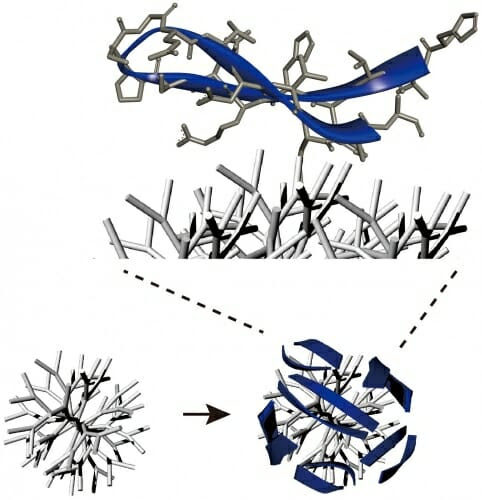A group of Russian scientists have synthesized manganese-zinc ferrite nanoparticles that can potentially be used in cancer treatment ITMO UNIVERSITY One of the most important global goals in today’s medicine is finding ways to combat cancer. Currently, there are several kinds of treatments with differing effectiveness and various side effects. In most cases, the treatment...
Tag: <span>nanoparticles</span>
Cheap nanoparticles stimulate immune response to cancer in the lab
University of Wisconsin–Madison researchers have developed nanoparticles that, in the lab, can activate immune responses to cancer cells. If they are shown to work as well in the body as they do in the lab, the nanoparticles might provide an effective and more affordable way to fight cancer. They are cheaper to produce and easier...
Chemo-Loaded Nanoparticles Piggyback on Red Blood Cells to Treat Lung Cancer
CONN HASTINGS | MATERIALS, MEDICINE, NANOMEDICINE, ONCOLOGY Scientists at Harvard’s Wyss Institute have developed a technique to deliver chemotherapy to the lungs using red blood cells. The method involves binding chemotherapy-loaded nanoparticles to red blood cells, which are then injected into the bloodstream. Once the red blood cells reach the lungs they have to squeeze...
Nanoparticles Cross Blood-Brain Barrier to Treat Stroke
NOVEMBER 7TH, 2019 MEDGADGET EDITORS CRITICAL CARE, EMERGENCY MEDICINE, MATERIALS, MEDICINE, NANOMEDICINE, NEUROLOGY, NEUROSURGERY Ischemic strokes can cause havoc in the brain, but early and properly directed treatment can mitigate a lot of damage. While there are a number of options to unclog blocked arteries, the potential to provide additional drug therapy remains mostly unexplored...
Silencing RNA nanotherapy shows promise against pancreatic cancer
by University of South Florida Despite advances in cancer survival, more than 90 percent of people with pancreatic cancer die within five years. Most patients with pancreatic tumors (and half of those with colorectal cancers) carry a mutation in the KRAS gene, which normally controls cell growth and death. The KRAS oncogene was discovered more...
Machine Learning Helps Design Complex Immunotherapies
Researchers from Northwestern University have leveraged machine learning to aid in the design of nano-medicines for immunotherapy. They utilized a high-throughput method to synthesize 800 unique immunostimulatory nanoparticles called Spherical Nucleic Acids (SNAs). “Spherical nucleic acids represent an exciting new class of medicines that are already in five human clinical trials for treating diseases, including...
Inhaled nanoparticles could treat lung cancer
by Queensland University of Technology QUT pharmaceutical scientist Dr. Nazrul Islam, from School of Clinical Sciences, said lung cancer was one of the most common cancers globally and one of the deadliest, being a leading cause of cancer deaths. He said chitosan had long been investigated for drug delivery and medical applications. It is made from refined crustacean (prawns, crabs, lobster) shells and...
Mushrooms’ and ‘brushes’ help cancer-fighting nanoparticles survive in the body
For a number of innovative and life-saving medical treatments, from organ replacements and skin grafts to cancer therapy and surgery, success often depends on slipping past or fending off the body’s immune system. In a recent development, aimed at aiding cancer detection and treatment, Drexel University researchers might have found the ideal surface texture for...
Oral delivery of nanoparticles
AMERICAN CHEMICAL SOCIETY Nanoparticles show great promise as diagnostic tools and drug delivery agents. The tiny particles, which scientists can modify with drugs, dyes or targeting molecules, can travel in the circulation and squeeze through small spaces into cells and tissues. But until now, most nanoparticles had to be injected into the bloodstream because they...
Nanoparticles Heat Up in Magnetic Field to Kill Cancer Tumors
A team of researchers, headed by a group from University at Buffalo, has developed a new nanoparticle that can be used to cook tumors to death. The zinc ferrite nanoparticles can be activated by a low strength magnetic field, making the technology clinically applicable. The nanoparticles will hopefully be paired with antibodies, or other targeting mechanisms, and...


